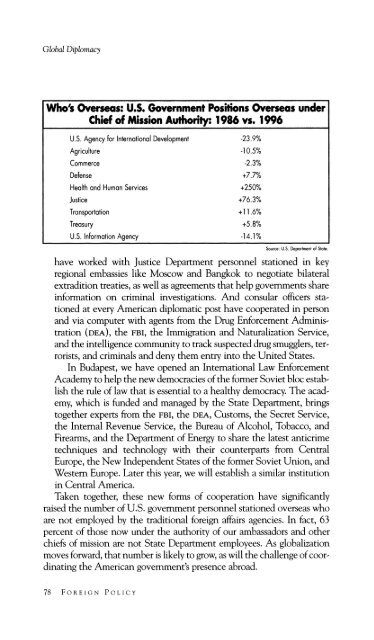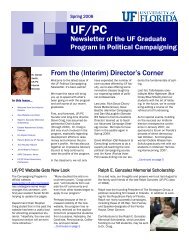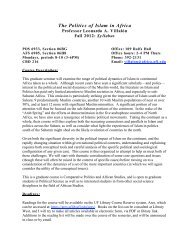Globalization and Diplomacy: A Practitioner's Perspective
Globalization and Diplomacy: A Practitioner's Perspective
Globalization and Diplomacy: A Practitioner's Perspective
Create successful ePaper yourself
Turn your PDF publications into a flip-book with our unique Google optimized e-Paper software.
Global<br />
<strong>Diplomacy</strong><br />
Who's Overseas: U.S. Government Positions Overseas under<br />
Chief of Mission Authority: 1986 vs. 1996<br />
U.S. Agency for International Development -23.9%<br />
Agriculture<br />
-10.5%<br />
Commerce -2.3%<br />
Defense +7.7%<br />
Health <strong>and</strong> Human Services +250%<br />
Justice +76.3%<br />
Transportation<br />
+ 11.6%<br />
Treasury<br />
+5.8%<br />
U.S. Information Agency<br />
-14.1%<br />
Source: U.S. Department of State.<br />
have worked with Justice Department personnel stationed in key<br />
regional embassies like Moscow <strong>and</strong> Bangkok to negotiate bilateral<br />
extradition treaties, as well as agreements that help governments share<br />
information on criminal investigations. And consular officers stationed<br />
at every American diplomatic post have cooperated in person<br />
<strong>and</strong> via computer with agents from the Drug Enforcement Administration<br />
(DEA), the FBI, the Immigration <strong>and</strong> Naturalization Service,<br />
<strong>and</strong> the intelligence community to track suspected drug smugglers, terrorists,<br />
<strong>and</strong> criminals <strong>and</strong> deny them entry into the United States.<br />
In Budapest, we have opened an International Law Enforcement<br />
Academy to help the new democracies of the former Soviet bloc establish<br />
the rule of law that is essential to a healthy democracy. The academy,<br />
which is funded <strong>and</strong> managed by the State Department, brings<br />
together experts from the FBI, the DEA, Customs, the Secret Service,<br />
the Internal Revenue Service, the Bureau of Alcohol, Tobacco, <strong>and</strong><br />
Firearms, <strong>and</strong> the Department of Energy to share the latest anticrime<br />
techniques <strong>and</strong> technology with their counterparts from Central<br />
Europe, the New Independent States of the former Soviet Union, <strong>and</strong><br />
Western Europe. Later this year, we will establish a similar institution<br />
in Central America.<br />
Taken together, these new forms of cooperation have significantly<br />
raised the number of U.S. government personnel stationed overseas who<br />
are not employed by the traditional foreign affairs agencies. In fact, 63<br />
percent of those now under the authority of our ambassadors <strong>and</strong> other<br />
chiefs of mission are not State Department employees. As globalization<br />
moves forward, that number is likely to grow, as will the challenge of coordinating<br />
the American government's presence abroad.<br />
78 FOREIGN POLICY








